Roe and the American Revolutions Cycle at OSF
Dramatic, Present, and Human
The original idea behind Oregon Shakespeare Festival’s American Revolutions: The United States History Cycle was to commission a new play for every American president. But when Artistic Director Bill Rauch brought in his longtime colleague from Cornerstone Theatre Company, Alison Carey, to direct the program, she steered it towards a more inherently dramatic premise: To commission thirty-seven new plays about a moment of change in American history. Associate director of the program, Julie Felise Dubiner, told me she thinks the idea is working because “it lets playwrights follow their passions and that moment-of-change imperative implies dramatic action.”
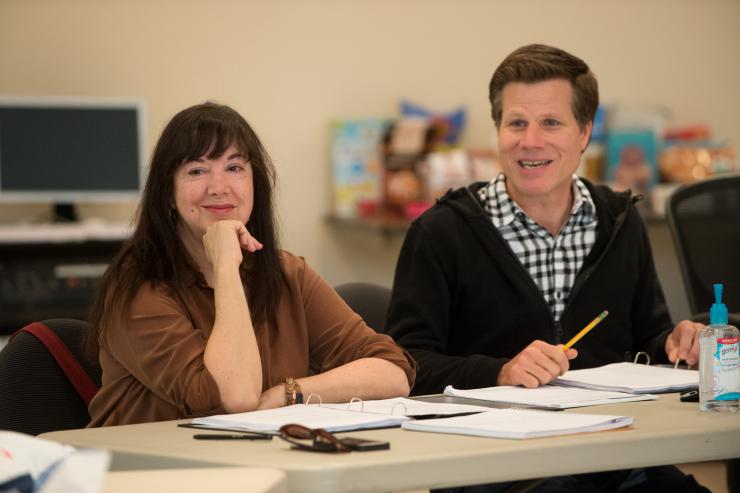
If the number thirty-seven sounds familiar, it’s because that’s the number of plays generally accepted as written by Shakespeare. According to Rauch, “Both canons—Shakespeare's and our American Revolutions plays—are composed of relatively large-cast epics that employ a variety of tonal and stylistic devices.” But, he added that the new plays offer at least one very important thing that Shakespeare’s plays are missing:
As a large classical theatre, with the overwhelming preponderance of male playwrights in the classical canon, we have to work even harder to include women's voices in the work that we commission ourselves. Women are the majority of ticket-buyers, theatre attendees, and of course the population of the world in general. Our field's lack of respect for gender equity is appalling.
Dubiner agrees that choosing which playwrights to commission has been at least partly a product of their desire to diversify their stages:
There’s a specific way of handling plot and drama, there’s a specific type of passion for history, there’s the kind of passion someone needs for character when writing a history play. And we are deeply committed to the idea that, when we’re done, we will have created diversity in every way—diversity of ethnicity and religion and gender as well as of style and storytelling.
Other than three targeted commissions, the American Revolutions Cycle has allowed playwrights to choose the moment of change about which they want to write. The process has been guided by what Dubiner calls “passive curation,” in which the theatre brings the writers together to talk to each other about their projects, ensuring as little overlap as possible. The program has yielded instant classics, like Robert Schenkkan’s All the Way, about LBJ passing the Civil Rights Law and running for reelection, which became a Broadway show and an HBO special, and Lynn Nottage’s Sweat about the deindustrialization of America, which was a co-commission and co-production with Arena Stage. Currently on OSF’s boards, audiences can find Lisa Loomer’s rollercoaster ride of a play about reproductive rights, Roe, directed by Rauch.
Neither Loomer nor Rauch initially realized that they had chosen a moment of change that not only makes a great story, with a number of little known twists and turns, but also provides opportunities for all kinds of diversity in addition to great roles for women.
Roe begins just before the meeting of Sarah Weddington, the lawyer who argued Roe v. Wade, and Norma McCorvey, the woman who is usually known as Jane Roe. It tells the story of the case, the relationship between the two women, and the dramatic changes that McCorvey has undergone in her life, right up to the present. In fact, for a history play, the piece is very much a product of its current moment—Loomer even wrote a new line based on the Supreme Court’s decision in Whole Woman’s Health v. Hellerstedt, in which the Court ruled that Texas cannot place restrictions on the delivery of abortion services that create an undue burden for women seeking an abortion.
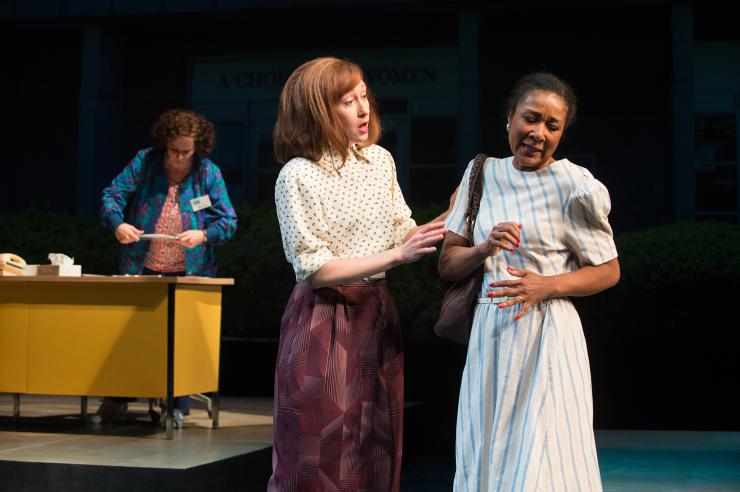
Neither Loomer nor Rauch initially realized that they had chosen a moment of change that not only makes a great story, with a number of little known twists and turns, but also provides opportunities for all kinds of diversity in addition to great roles for women. In fact, they didn’t know a lot about their topic when they started out. Rauch told me that,
Before directing this play I knew very little about the history including the divergent paths of Sarah Weddington and Norma McCorvey. Some of my colleagues at OSF also helped educate me about the role women of color in particular played in the battle for reproductive rights justice.
Loomer echoed those sentiments:
When I began to do research, I did not know the points of Blackmun’s decision, which have come to influence subsequent cases on abortion. I did not know that Sarah Weddington clearly stated, at twenty-six, in the Supreme Court, that she was not advocating abortion, she was not saying that it was “good” or “bad.” She was advocating choice. Something else that surprised me was how race and class are bound up in the larger subject of reproductive rights. In the very first moments of the play, one of the protagonists says that one’s account of “history” is colored by factors such as race, gender, class, and sexuality. This idea is a predominant theme in the play and I saw it played out again and again in my research.
Like the creators of the show, the audience for Roe might leave knowing a lot more about Roe than they came in knowing. They will discover, for example, that the Roe baby was McCorvey’s third child, but before that pregnancy, she had never even heard of abortion. With the third child, she tried to self-abort but failed, and, as the case took its time making its way through the courts, “Roe” eventually gave birth and gave the baby up in a closed adoption. Two weeks after giving birth, McCorvey tried to commit suicide. Audiences might also be surprised to learn how prominent a role women of color play in the reproductive rights movement and to see those women onstage alongside their white feminist counterparts.
Informed by all of this, Loomer has written a play that refuses to oversimplify what is obviously a very complex topic. Using a variety of structural components, such as narration, direct address, and on stage costume changes; other actors staying on stage to observe and help with transitions; projections; and suggestive props and costumes, Loomer has intricately depicted not just the complexity of the story, but also the complexity of telling a complex story.
The larger structure of the play is that of a memory, created by the characters beginning the play in the present, telling the audience who they are and what they’re going to be reenacting for us, and ending the play back in the present. These bookends dramatize the idea that memories, the material out of which history is made, are themselves imperfect and often contradictory. References to a variety of sources, such as books, historians, obituaries, and Wikipedia, remind the audience that even with a great deal of research, history is still a product of a many different forces and not fully understandable from any one point of view. An accompanying stylistic blurring of reality, especially in the scenes in which McCorvey is using drugs and drinking, reminds us that reality itself, at any given moment, might not be what we think it is.
This combination of epic devices, the structure of a memory, moments of surrealism, and a focus on the character of Roe all keep Roe from being didactic docudrama. In fact, Loomer and Rauch have been pleasantly surprised by how much empathy the audience feels for Norma, given her difficult life and sometimes questionable choices. Loomer says this came from her desire not to oversimplify:
A man I respect a great deal and conferred with, Father Greg Boyle, talks about the value of having a “reverence for the complexity of human beings.” What surprised me in my research, what never ceases to surprise me, is how complex we are. When you see that … well, for me at least, it’s the beginning of compassion. Even compassion for “the other side.”
Nevertheless, abortion itself is such a polarizing topic that OSF planned ahead for the potentiality of pushback and/or emotional responses to the play. They sought and received a grant from the General William Mayer Foundation to bring in a trainer to help them create emergency protocols and procedures to deal with, for example, a company or an audience member being triggered. Most of OSF’s post-show discussions are led by actors, but with Roe, the company decided to also always have a staff member from the education department or the Revolutions Cycle there to field questions that the actors might not want to or be able to address. Oregon is an open carry state, so OSF made sure to clearly define that patrons cannot bring guns into theatre.
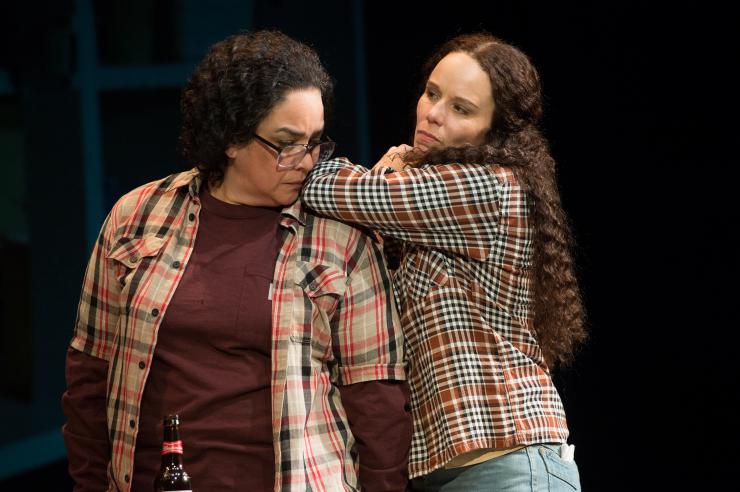
Dubiner says most of these measures will remain in place as part of a larger effort to practice good “company and audience care” and better engage in all kinds of dialogue. In fact, though the connection has not been explicit, Dubiner sees this training as part and parcel of the work the theatre is doing on diversity, which also involves a lot of trainers, and is essentially about answering the question, “How do we talk to one another?”
What better play to do this work around than Roe, a play on a topic about which America has almost completely lost the ability to dialogue? Loomer says she gets letters every day from patrons telling her the ways in which seeing the play enabled them to talk about abortion, sometimes for the first time:
One woman who is “pro life” told me that she talked about the issues with a “pro choice” friend on the car ride back from Oregon to California. They had never broached the subject before. It is my hope to get people talking. In this country, we yell, we obstruct, we wave placards. We don’t talk.
Perhaps the quality of the play’s dialogue and the dialogue it creates are a result of how much dialogue went into writing the play and mounting the production. The American Revolutions Cycle was able to support Loomer on a research trip to the University of Texas at Austin where she did a reading of the play, solicited feedback from students, attended women’s studies classes, and otherwise engaged with the people and culture about which she was writing. Moreover, the production itself is a three-way co-production with Arena Stage and Berkeley Repertory Theatre, necessitating an additional layer of dialogue between three different institutions in three different cities.
In fact, all of the American Revolutions productions have been produced or presented elsewhere by design. Knowing that it may take quite some time to produce thirty-seven plays, the Cycle has been encouraging playwrights to identify where their home theatres are (or where they wish they were). Then the theatre reaches out on their behalf, ensuring that writers are getting the opportunity to work with people they want to work with and to have their plays seen by a wider audience.
The more I thought about the issues in the play, the more I questioned why we want to take what is complex, what is difficult in life, and make it simple. Why should it be easy?
Co-producing shows designed for a rep company has required some innovative management on the part of OSF. Unlike most co-productions, OSF is not splitting production costs with their partners down the middle. Rather, their partner theatres are paying them a flat fee for the elements they send, like sets, costumes, and/or props. OSF doesn’t charge for their build labor, but the fee does include a component for rehearsal costs. The individual theatres are then responsible for their own running costs, including actor and technician salaries and repairs or changes to the physical production elements. Each theatre makes a separate licensing agreement with the playwright, pays creative salaries separately, and keeps their own ticket revenue. This particular model is both cost-effective and a necessity of OSF’s rep system, in which it’s very hard to separate labor costs by project.
The level of complexity involved in producing Roe was present in Loomer’s writing process as well, and she is celebrating that:
The more I thought about the issues in the play, the more I questioned why we want to take what is complex, what is difficult in life, and make it simple. Why should it be easy?
My guess is that none of the American Revolutions Cycle plays make history especially easy—because history is not, in fact, easy—but they do make it dramatic, present, and human. Rauch put it simply:
In these crazy political times, [these plays] are a reminder that who we are as a country and the choices we make are important and impactful, and will be affecting the lives of Americans for decades, if not centuries to come. Countries and their histories are serious business, and we treat them with the importance they deserve.

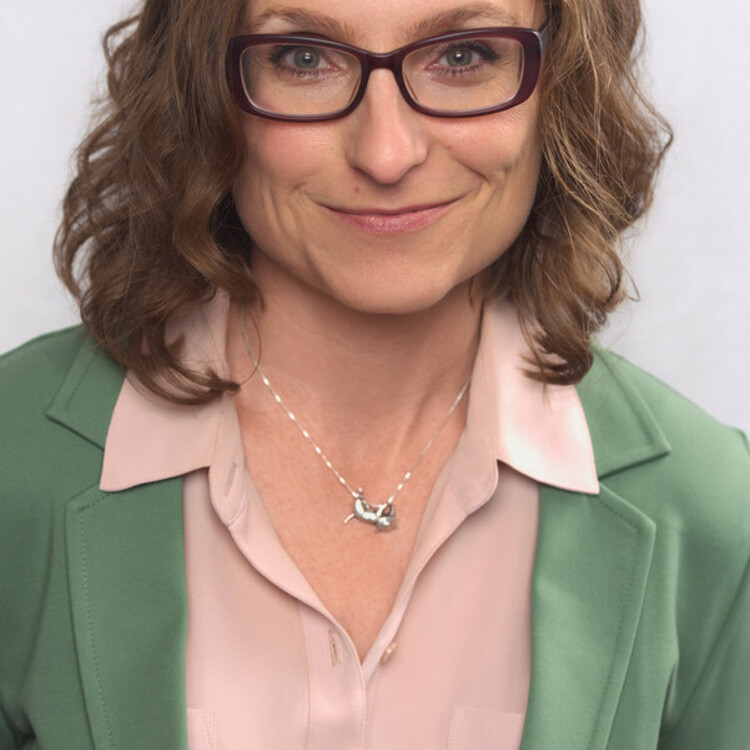
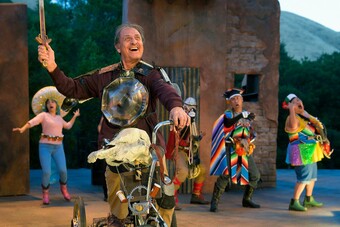






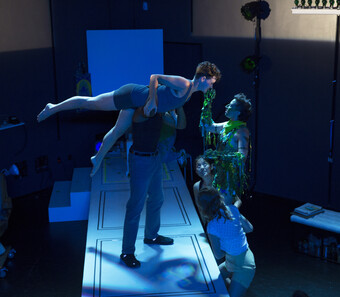

Comments
The article is just the start of the conversation—we want to know what you think about this subject, too! HowlRound is a space for knowledge-sharing, and we welcome spirited, thoughtful, and on-topic dialogue. Find our full comments policy here
This play is amazing, on target, and a scary reminder that we still have much to do to protect our own bodies. If you EVER have a chance to see this play, please do. It's currently in Ashland, Oregon. Love to know where it is happening next.